No Echo Read online
Page 15
“At home.”
“At home. Despite Entré being open on Sundays. Okay then.”
“I hadn’t had a day off for five weeks.”
“What did you do?”
Gagliostro had begun to sweat again. He must suffer from some sort of illness, and it crossed Billy T.’s mind that it must be a serious handicap for a head waiter and restaurant owner to have hydrocephalus and sweat like a pig in eleven degrees of heat.
“I watched TV and went to bed early.”
“On your own?”
The desperate expression on Gagliostro’s face was answer enough. Billy T. ventured to rise from the chair. His legs were unsteady and he shook them tentatively, before stuffing the Dictaphone in his pocket and heading for the stairs.
“Nine o’clock tomorrow morning. On the dot. At police headquarters. Ask for Billy T.”
Only now did it dawn on him that he had never actually introduced himself.
“Billy T.,” he repeated. “That’s me.”
27
Istanbul was a gray sea of stone buildings wedged between two vivid blue dots. That was how she imagined the city. She had never been there. A span of silver between the Bosphorus Strait and the Blue Mosque, with the fragrance of spices and oriental rugs in between. That was how she pictured Istanbul.
Within this image, a woman was walking around thinking of her. Someone was strolling through the ancient city of Constantinople, perhaps wending her way through the famous bazaars, maybe wearing sunglasses against the fierce sunlight, en route to the bathhouse, to the mosaics and the health-giving waters below the sound of prayer calls from the minarets that jutted toward heaven, everywhere – and this woman was thinking of her.
Hanne Wilhelmsen opened her eyes and read the card again.
She could not fathom how it could have arrived so quickly. She did a mental calculation. Eight days had elapsed since they had parted. She knew that Nefis was returning to her homeland that same morning. Just over one week ago. The last time Hanne had received a postcard from Turkey was when Cecilie had been there on holiday with her group of female medic friends. Cecilie had been home for five days by the time the greeting had finally been delivered.
When she came across the card, she didn’t believe it was meant for her. She looked at the close-up image of reddish-brown carpet with an indescribable pattern, slightly annoyed that the postal system was so inefficient, before glancing at the address. “Ms. Hanne Wilhelmsen, Norwegian Police Headquarters, Oslo, Norway, Europe.” Almost like when she was a child and had gone on to say, “The World, The Milky Way, The Universe.”
I live under the moon, and it is a cold planet. I can never forget, but the stars are not for us? Yours, Nefis.
The signature had made her forget that day’s allocation of Ziegler case documents. She had locked herself into her office. The text was strange and beautiful, and she did not understand a word of it.
Question mark.
What did she mean?
Hanne had been in love once before in her life. When she had been in the third year at high school, she had caught sight of Cecilie and, like a semi-tame dog, had slinked about without saying anything, without giving any sign other than that she was always on the outside, but in close proximity. Then they had come together, as they should, as they were always meant to, and that was where they had remained. They stayed together until Cecilie no longer existed and Hanne thought she would die too.
With Nefis it was different. Nefis and Hanne were adults with wounds and scars and history. Cecilie was new when everything was new, when everything was untouched and they could shape themselves in each other’s likeness without actually ever accomplishing that.
Hanne brushed her lips against the card. She sniffed its scent.
She would reply. She yearned to send a few words in return, and cursed herself for not being more far-sighted. For all Hanne knew, Nefis Özbabacan might be the most common name in Turkey. Istanbul was huge. How huge? Nefis had told her that she was a professor of mathematics, but she might have meant that she was a high-school teacher. There was a university in Istanbul. Hanne was certain of that when she racked her brains. But maybe there were several. Istanbul might be full of universities, high schools, educational institutions. She could not find space for them all when she shut her eyes and once again pictured in her mind’s eye that broad belt of terracotta houses between the Blue Mosque and the Bosphorus Strait, but she shook her head, realizing she had never been there.
Hanne held the postcard to her lips and thought of Nefis. She thought of Cecilie. She thought of the apartment it had seemed so impossible to move back home to, with Cecilie’s fingerprints everywhere: on the kitchen walls that Hanne wanted to be blue, but which had been painted yellow because that’s what Cecilie wanted and Hanne never had time to do any painting anyway; on the settee they had bought with money they did not have, since Cecilie had seen it in a window on her way home from the cinema and could obtain an interest-free loan from her employer. Cecilie was everywhere, and Hanne did not even know where she was buried.
She thought of Cecilie’s mother and father. They had sat together, holding hands, in the harsh light of the hospital corridor the night Cecilie had died. Their daughter. Hanne sat at her bedside, without ever considering that this was their place, the parents’ place, as well.
She knew where they lived.
28
Thomas looked after Tigerboy very well. Mrs. Helmersen would not get hold of his cat this time. Helmer had normally been allowed to go out by himself, but Tigerboy had to stay inside the whole time until Thomas came home from school. Then Thomas ate the slices of bread that his mum had left on a plate in the fridge and shared some of it with Tigerboy. He wasn’t allowed to do that, but the cat was so fond of liver pâté.
He was always scared when he carried Tigerboy downstairs past Mrs. Helmersen’s front door. She could come out at any minute. It was almost as if she could smell him scuttling past. Quite often she would stick her head out to see who it was. Even though he crept as quietly as he could.
Thomas stood on the landing on the second floor, craning carefully over the railing. He mustn’t lose Tigerboy. He could hear nothing except the traffic on Kirkeveien. He kicked off his wellington boots. They made a terrible squeaking noise, so he carried them in one hand and clamped Tigerboy tightly to his body with the other.
Halfway down the stairs he saw that Mrs. Helmersen’s door was ajar. He wanted to turn tail, but had so much to carry that he let go of Tigerboy. The skittish kitten jumped, landing softly, and bounded down the steps to disappear into Mrs. Helmersen’s apartment.
Thomas felt tears spring to his eyes and a sudden urge to pee again. He really needed to go, though he had just been to the toilet. He sat transfixed on the stair, hardly daring to breathe. Nothing happened.
Maybe Mrs. Helmersen was not at home. Maybe she had gone out for a walk and had just forgotten to close the door. Dad always called her a senile old hag, when he thought Thomas out of earshot. Senile meant forgetful, and someone who was forgetful might easily leave a front door open when they went out. Thomas did it himself quite often, and he wasn’t even senile.
Cautiously, he inched his way down the last few steps and across to the door.
“Hello,” he whispered. “Tigerboy …”
Neither Tigerboy nor Mrs. Helmersen made a sound.
Thomas pushed the door gingerly, ever so slightly, and it slid open. There was a really odd smell in the apartment. Not a nasty smell, really, just very strong. Food and perfume and old things. It smelled a bit like Grandma, but not as nice.
Although Thomas was frightened, it was also pretty exciting to be in Mrs. Helmersen’s apartment. He had never seen anything like it before. In the hallway there were so many things that he almost had to shrink into himself to avoid knocking anything over. Four mirrors in large ornate frames hung on the walls. He could barely see the wallpaper because where there were no mirrors, there were pictures. And
lamps, the kind attached to the wall with two arms and fabric shades with little soft bobbles along the edge that Mum thought ghastly.
The double doors into the living room were also open slightly. The gap was big enough for Tigerboy, anyway. Thomas stuck his head into the spacious room.
“Tigerboy,” he said joyfully.
The kitten was perched on top of an old dresser, washing himself. Thomas zigzagged between massive tables and chairs that did not budge an inch and lifted the animal.
“Tigerboy,” he whispered into the warm fur.
Then he surveyed the room.
He had never ever seen so much medicine. Apart from at the pharmacy, that is, having been there twice with his grandma. At home in his apartment his mum and dad kept medicines in a locked cabinet in the bathroom, with a picture of a snake creeping up a sort of sword on the door. There would be no room for all this in Dad’s medicine cabinet. Boxes and jars and packets were piled up on top of the dresser where Tigerboy had been sitting. Thomas grew worried in case the kitten had eaten any of it, but it looked as if all the lids were in place. He glanced around the living room and saw even more medicines on a table in the corner beside the TV. And on the dining table. And on the radio. All over the place.
Thomas did not want to be here. The odor was too strong, and Mrs. Helmersen might come back at any minute. He retraced his steps to the entrance. Then he noticed the pictures. Not the kind of framed family photos that hung on the wall in the hallway, but pictures of people from the newspapers, fixed to the wallpaper with thumb tacks. He recognized some of them. Thorbjørn Jagland had been Prime Minister when Thomas was a toddler. The picture was not particularly good, and someone had written something across his face that Thomas wasn’t able to read. Crown Prince Haakon had been cut out of a weekly magazine. The color photo showed him on skis.
Thomas wanted to leave. He no longer needed to pee, but Tigerboy needed to go outside. For a moment or two he wondered whether he should slam the door behind him. It would be best to leave it open. Maybe Mrs. Helmersen had left it like that on purpose.
29
Sindre Sand was not so sure what he had actually expected. However, it certainly wasn’t this. When he entered the tiny bedsit, he smelled the aroma of roast lamb and sage. Vilde was wearing black trousers and a gray chenille sweater with a plunging neckline. Tea lights, almost certainly twenty of them, in little glass pots scattered throughout the room made him feel that the clock had been turned back. Nothing had happened. Vilde had just found herself a new place to live, but everything was temporary and they would be married in the summer.
“I just needed to finish before I let you in,” she said, offering him red wine in an enormous stemmed glass. “Sit down.”
He said nothing about how beautiful it was. He did not even ask how she could know he was going to ring the doorbell on this particular night at this exact time. He took off his jacket, the smart one Vilde had given him a long time ago, before Brede.
She continued undressing him. He undressed her.
Nothing had changed, and afterwards they fell asleep.
“Fuck! The lamb roulade!”
She leapt up out of bed in the little alcove and dashed over to the kitchenette. When the jet of water from the tap hit the cast-iron casserole with its incinerated contents, clouds of smoke belched out into the room. The smoke alarm screeched.
“Open the window,” she yelled, laughing, and flapped a newspaper for all she was worth at the noisy device. “Air! Help!”
He threw the window open wide and she shivered in the ferocious draft that gusted into the room. The casserole was left in the sink and she rushed back across the floor to wrap herself in the quilt. Still laughing, she waved him over to her with one finger poking over the edge.
Sindre did not even smile. He began to pull on the clothes strewn over the floor.
“What’s wrong with you, Vilde?”
His voice was sullen, as if it had suddenly struck him that in actual fact nothing was different from the way it had been since Brede had arrived on the scene and helped himself to what belonged to Sindre.
“You’re behaving like the Merry Widow, I must say.”
He snatched his sweater from a chair and struggled to force the tight neck over his head.
“Come and sit down, then. Let’s talk.”
She too was serious now. Although he hesitated, he hauled on his trousers.
“We don’t really have anything to talk about. What’s done is done. What’s eaten is eaten.”
“We didn’t do much eating, did we?” she said. “Why did you come, then, if you don’t want to talk to me?”
“To see how you were. How you’re … coping with it all.”
The words hung in the air before him like an accusation, and he stared into space.
“I see you’re fine,” he said all of a sudden, tightening his belt. “But I hadn’t exactly expected to be invited to … a party tonight.”
He crouched down to retrieve his socks. When he stood up again, it looked as if Vilde’s head had receded into the quilt.
“But the money, Sindre! Don’t you understand that everything’s okay now, and we have money and can …”
He hooked his jacket over his arm and left.
30
The hire car was an automatic. She was not used to that: even in the USA she normally insisted on a manual gear shift. En route through Oslo she braked suddenly every time she intended to depress the clutch. A hot-tempered Opel Omega nearly crashed into her, and she thought she felt a faint bump on the fender. Perhaps that was a signal. However, she refused to turn back.
She kept to eighty kilometers per hour in the ninety zone on highway E18. She was in no hurry. She parked the vehicle less than half an hour after she had collected it at Bislett. Not directly beside the property in the spot obviously meant for visitors, but a hundred meters farther down the quiet cul-de-sac. Candelabras and plastic stars shone between the curtains in the windows of the villa; a couple of Christmas trees wrapped in plastic netting were already propped up against the walls of the house, awaiting the festivities. Smoke rose from the Vibe family’s chimneystack.
Hanne Wilhelmsen hovered at the gate.
She had been there before. Many times. Cecilie had chosen the world’s longest journey to school: she wanted to go to Katta, the Cathedral School in Oslo, despite having to get up at six o’clock every morning to catch the train from Drammen. Hanne had once asked her how it had all been arranged, as far as formalities were concerned. Cecilie had smiled and shrugged. Her father was the Director of Education in Buskerud County, and Hanne had never asked again.
She glanced up at the only dark window. The unoiled hinges protested in the cold. She closed the gate carefully behind her. The temperature had crept down to minus ten degrees Celsius, and the gravel crunched on the soles of her shoes. A holly garland with red berries and a silk ribbon embellished with the word “Welcome” decorated the front door. Before she had summoned the courage to ring the bell, the door opened.
“Hanne,” Inger Vibe said amiably, as if Hanne were a daily visitor. “I heard you in the driveway. Well, not you exactly, but …”
She laughed softly, laughter that Hanne had to close her eyes to withstand; she stood there, motionless, for so long that Inger Vibe finally placed her hand on Hanne’s arm to encourage her to step inside.
“We’ve been waiting for you,” Cecilie’s mother said. “Come in.”
Her back was Cecilie’s back. The way she moved her feet, soundlessly, with short steps, as if unintentionally stealthy, was Cecilie’s gait. There was a fragrance of oranges in the living room, and from the window ledge Hanne heard the delicate sound of miniature cherubs swimming in the hot air above a lighted candle; they struck tiny brass bells, rhythmic and almost inaudible.
“Is it you, Hanne? Take a seat.”
Cecilie’s father laid down his book and stood up, hesitantly offering her his hand.
“It’s been such
a long time.”
Hanne sank into a deep armchair. The scent of oranges increased in intensity.
“Where have you been?”
For a moment she was unsure who was asking. She let her eyes leap from one to the other, feeling hot and sticky. A huge bowl on the coffee table overflowed with brightly colored fruit. Hanne blinked fiercely, desperate for someone to dim the light.
“I came to give you this.”
She fiddled with the catch at her neck.
“Am I to have that?”
Inger Vibe held the palm of her hand up to her mouth, as if she had just won the lottery. The gesture irritated Hanne. When she handed over the necklace, her movements were more abrupt than she had intended.
“I gave this to Cecilie years ago. One birthday. She loved it, I think, and—”
“She always wore that necklace,” Arne Vibe said. “Always.”
“It’s not right for me to wear it myself. It was Cecilie’s necklace. You can have it.”
Neither said thank you. They looked at each other with eyes that made Hanne feel undecided. Her discomfort made her perspire even more, and she opened her mouth to breathe more easily. Inger Vibe went into the kitchen. Her husband toyed with his book, taking his glasses off and on and continuing to smile without saying a word. His smile was friendly enough, but at the same time contained a sort of neutrality, a kind of distance that made her want to leave. She had done what she had to do. She had given them the jewelry.
This wasn’t what she wanted.
Eventually Inger Vibe returned. Placing a coffee cup made of old fine porcelain in front of Hanne, she poured coffee into it and offered her cakes from a stemmed dish.
“I really came to thank you. To say … I wasn’t entirely—”
“To apologize, perhaps?”
Arne Vibe was no longer smiling. Nevertheless his face displayed a gentleness on its strong features, in the gaze now directed at her for the first time.

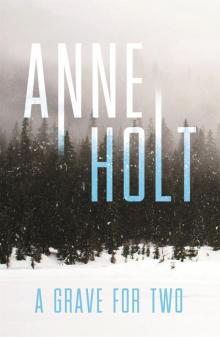 A Grave for Two
A Grave for Two Dead Joker
Dead Joker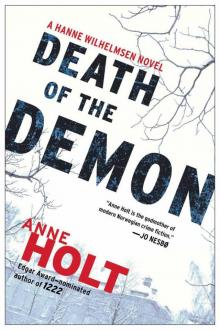 Death of the Demon: A Hanne Wilhelmsen Novel
Death of the Demon: A Hanne Wilhelmsen Novel Punishment aka What Is Mine
Punishment aka What Is Mine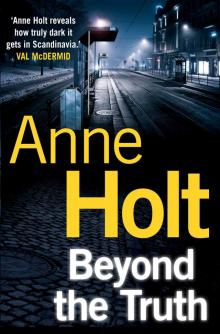 Beyond the Truth
Beyond the Truth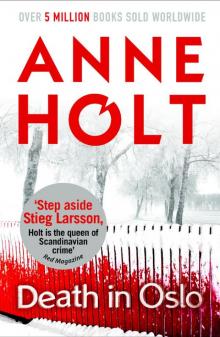 Death in Oslo
Death in Oslo The Blind Goddess
The Blind Goddess What Never Happens
What Never Happens 1222
1222 In Dust and Ashes
In Dust and Ashes Odd Numbers
Odd Numbers What is Mine
What is Mine What Dark Clouds Hide
What Dark Clouds Hide Blessed Are Those Who Thirst
Blessed Are Those Who Thirst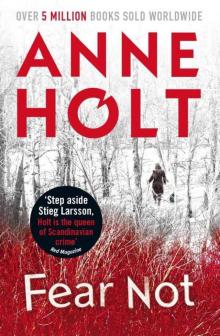 Fear Not
Fear Not No Echo
No Echo Hanne Wilhelmsen - 01 - The Blind Goddess
Hanne Wilhelmsen - 01 - The Blind Goddess